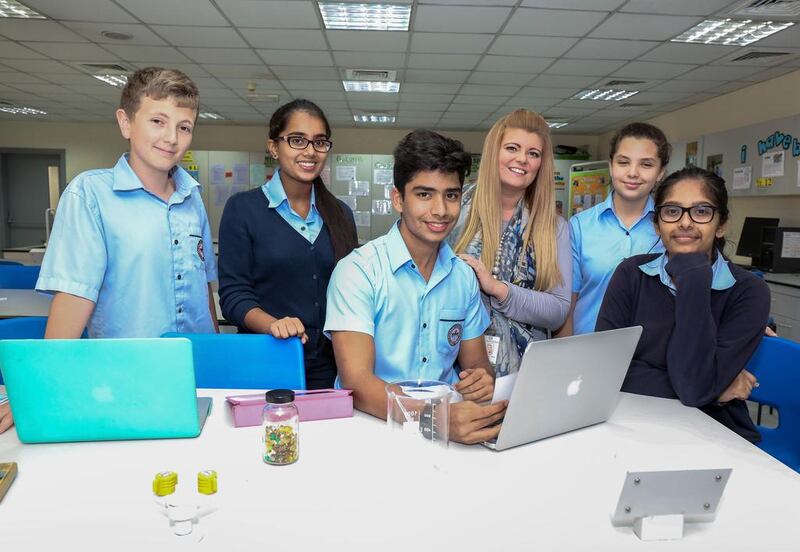ABU DHABI // Pupils on Thursday spent their breaks at lunch and between classes putting the finishing touches to their ideas for a science experiment in space.
With the deadline for the Genes in Space competition at midnight on Friday night, youngsters where finalising their proposals for experiments that analyse the effects of low gravity on the building blocks of life.
The contest – a collaboration between the UAE Space Agency, Boeing and The National – challenges pupils to come up with DNA experiments that take advantage of the unique environment in orbit. Open to pupils in grades 7 to 12 in all UAE schools, the competition's finalists will be mentored by scientists at Harvard University, the Massachusetts Institute of Technology and Khalifa University.
Winning pupils will travel to the United States to watch their experiment being launched to the International Space Station.
At the ISS, the experiments will be conducted by astronauts.
To ensure they met the deadline, pupils at the Emirates International School Meadows said they spent their breaks, lunches and time after school working on their ideas.
“We really didn’t mind giving up our free time because it was something that interested us and allowed us to be innovative at the same time,” said Anannya Sivakumar, 15, who, with two classmates, chose to research possible ways to reverse the negative effects space conditions have on astronauts’ neurons.
With cosmic radiation known to accelerate neurodegeneration, leading to diseases such as Parkinson’s and Alzheimer’s, Anannya’s group proposes to expose DNA samples to different levels of radiation aboard the ISS and put them in a hyper-gravity environment to counter the effects.
“We are hoping this could be used to benefit returning astronauts and potentially people with Parkinson’s here on Earth,” said the Grade 10 pupil.
The other two students in her group said the contest was unique in that it gave them the flexibility to choose the topics they wished to study and the challenge to come up with something new.
“Through the research we learnt about things we would have never come across,” said Talia Alhammoud, 14.
Preferring to focus on the food supplies for long-term space missions, Aashlesha Galla and Amr Kanan, both 14, decided to look into the possibilities of growing fresh food on the space station.
“We never understood why food wasn’t grown in space and why they always transported food, which is a waste of space and energy,” said Aashlesha.
The pair are hoping to use DNA analysis to see the possibilities of growing oranges, potatoes and kiwis, chosen for their nutritional benefits.
Amr said that regardless of whether his group was chosen as one of the finalists, he had already learnt a great deal from the work needed to enter.
“I didn’t even know that plants could be grown in space,” he said.
Having mentored both groups, Kayleigh Moss, the school’s assistant head of science, said she would love for more of these competitions to happen.
“They were having to do work that you would equate with grades above them or even at university level,” she said. “It allowed them to come up with their own ideas, do the research and think critically about it.”
Submissions are being accepted until midnight on Friday at genesinspace.org.
To find out more and get involved, follow #genesinspaceuae on social media or visit thenational.ae/uae/genes-in-space.
tsubaihi@thenational.ae






